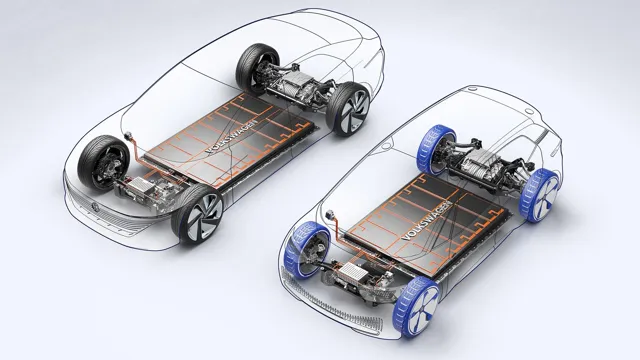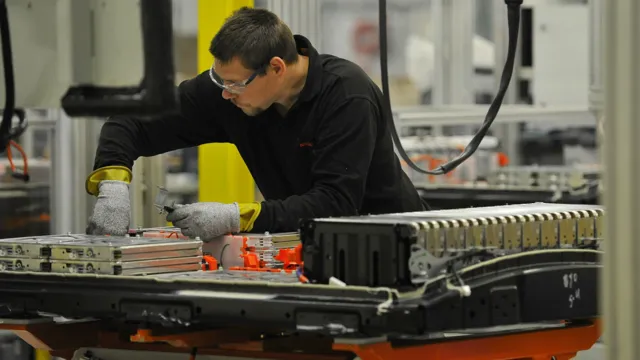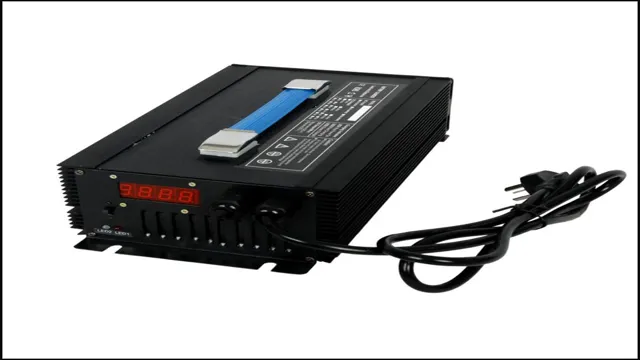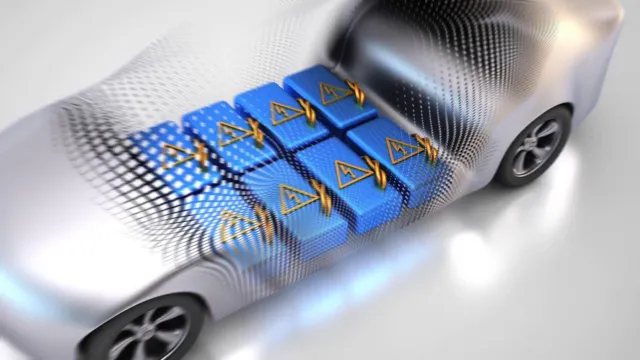Power Up Your Ride: Exploring the Different Battery Types for Electric Cars
Electric cars have been gaining popularity over the years as people become more environmentally conscious. With a need for sustainable alternatives to fuel-powered cars, electric vehicles (EVs) are slowly but surely becoming a mainstream choice. The revolution of electric cars, however, depends largely on their batteries.
These days you’ll often hear the words ‘lithium-ion’ when it comes to EV batteries, but are there any other types of batteries revolutionizing electric cars? In this blog post, we’ll explore some of the lesser-known battery types that are making waves in EV technology.
Lithium-ion batteries
When it comes to battery types for electric cars, lithium-ion batteries are currently the most commonly used. These batteries offer a high energy density, meaning they can store a lot of energy in a compact size, and they also have a long lifespan. In addition, they are relatively safe and environmentally friendly compared to other battery types like lead-acid or nickel-metal hydride.
However, there are still some concerns about the sustainability of lithium-ion batteries, as they require significant amounts of rare and expensive metals like lithium and cobalt to produce. As a result, researchers are exploring alternative battery technologies like solid-state batteries and lithium-sulfur batteries that may offer better performance and sustainability in the future. Nevertheless, for the time being, lithium-ion batteries remain the most practical and efficient option for powering electric cars on a large scale.
Advantages and disadvantages
Lithium-ion batteries are popular energy storage devices because of their high energy density and long lifespan. They are commonly used in portable electronic devices like mobile phones, laptops, and cameras, as well as electric vehicles. One of the biggest advantages of lithium-ion batteries is that they are lightweight, making them ideal for use in portable devices.
They are also highly efficient, which means they can store a large amount of energy in a small space. However, lithium-ion batteries also have some disadvantages. They can be expensive compared to other types of batteries, and they can be difficult to dispose of since they contain toxic materials.
Lithium-ion batteries are also prone to overheating, which can cause them to catch fire or even explode in extreme cases. Despite these drawbacks, lithium-ion batteries remain a popular choice for many different applications due to their many benefits.
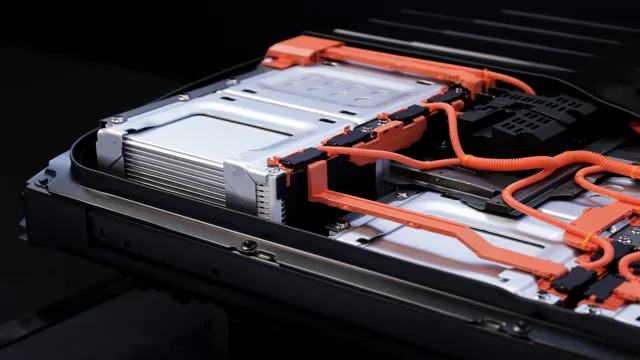
Current use in electric cars
Lithium-ion batteries have been a game-changer for the electric car industry. They are compact, reliable, and much lighter than traditional lead-acid batteries. The biggest advantage of lithium-ion batteries is their energy density.
They can store more energy per kilogram of battery weight, making them ideal for powering electric cars. Lithium-ion batteries are also more efficient than lead-acid batteries. They have a higher charging efficiency, which means greater energy savings.
They also have a longer lifespan, which means fewer battery replacements and lower maintenance costs for electric car owners. Of course, there are some challenges associated with using lithium-ion batteries in electric cars. The main disadvantage is the cost.
Lithium-ion batteries are more expensive to produce than lead-acid batteries, which adds to the cost of electric cars. However, as technology improves and production scales up, this cost is expected to come down. Despite the challenges, many automakers have embraced lithium-ion batteries as the future of electric cars.
Companies like Tesla, Nissan, and BMW are already using them in their electric cars, and many more are expected to follow suit in the coming years. As the technology continues to improve and costs come down, we can expect to see lithium-ion batteries become even more common in the world of electric cars.
Solid-state batteries
When it comes to battery types for electric cars, one promising option is solid-state batteries. These batteries use a solid electrolyte instead of a liquid one, which offers several advantages. For one, they can be smaller and lighter than traditional lithium-ion batteries, making them ideal for electric cars.
They also have a higher energy density, meaning they can store more energy in a smaller space. Additionally, solid-state batteries are less prone to catching fire, which can be a concern with the highly flammable electrolytes used in traditional batteries. Despite their advantages, solid-state batteries are still in the development stage and are not yet widely available.
However, many experts believe that they could become the norm in the near future as they offer better performance, safety, and sustainability. So, while they may not be a household name yet, solid-state batteries are definitely a technology to keep an eye on as the electric car industry continues to grow and evolve.
What they are and how they work
Solid-state batteries are the future of energy storage technology. These batteries differ from traditional lithium-ion batteries because they use solid electrolytes instead of liquid electrolytes. Solid-state batteries offer higher energy density and are safer than traditional batteries because they don’t pose a risk of leakage or combustion.
This makes them ideal for use in electronic devices such as smartphones and laptops, but their application goes beyond that. Solid-state batteries are a promising technology for electric vehicles as they provide a longer range and faster charging time. They can also be used in renewable energy storage systems, offering a reliable and cost-effective solution to energy storage problems.
Solid-state batteries are also an environmentally friendly option as they can be made from non-toxic materials and can be easily recycled. As the demand for energy storage solutions grows, solid-state batteries will undoubtedly play a crucial role in the future of battery technology.
Potential advantages over lithium-ion batteries
Solid-state batteries have been gaining popularity in recent years due to their potential advantages over traditional lithium-ion batteries. One major advantage is their increased safety, as solid-state batteries use a solid electrolyte instead of the liquid electrolyte used in lithium-ion batteries. This eliminates the risk of leakage, fires, or explosions that are associated with the liquid electrolyte.
Solid-state batteries also have the potential for higher energy density, allowing for longer battery life and more efficient energy storage. Additionally, they are more environmentally friendly as they don’t contain the heavy metals and toxic chemicals often found in lithium-ion batteries. Overall, solid-state batteries have the potential to revolutionize battery technology and improve the safety, efficiency, and sustainability of various applications.
Lithium-sulfur batteries
When it comes to electric cars, choosing the right battery type is a vital consideration. One of the most promising battery types for electric cars is the lithium-sulfur battery. This type of battery offers a high-energy density, which means it can store more energy in a smaller space than conventional lithium-ion batteries.
Additionally, lithium-sulfur batteries are cheaper and more environmentally friendly than their counterparts. While there are still some challenges to overcome, such as the lifespan of the battery and the potential for sulfur to dissolve and degrade the battery components, many experts believe that lithium-sulfur batteries have the potential to revolutionize the industry and make electric cars even more efficient and accessible. So, if you’re in the market for an electric car, it’s worth exploring the different types of batteries available, and considering the benefits of the lithium-sulfur option.
What they are and how they work
Lithium-sulfur batteries are the newest breed of batteries that promise to revolutionize the energy storage market. These batteries are lighter and smaller than traditional lithium-ion batteries, making them ideal for portable devices. They work by using sulfur as the cathode and lithium as the anode, with a porous separator in between.
When a current is applied, the lithium ions move from the anode to the cathode, where they react with sulfur to form lithium sulfide. With a lithium-sulfur battery, you can get a voltage more than twice that of a lithium-ion battery, as sulfur has a higher energy density than lithium. Moreover, these batteries are environmentally friendly, as sulfur is abundant and cheap compared to the rare-earth metals used in lithium-ion batteries.
Although still in the developmental phase, lithium-sulfur batteries have garnered significant interest from many industries, including electric vehicles, aerospace, and renewable energy storage systems. By creating a larger battery pack for electric vehicles, it could mean that they will be able to travel further and longer, making a significant impact on reducing carbon emissions.
Advantages over lithium-ion batteries
Lithium-sulfur batteries have several advantages over lithium-ion batteries. These batteries have a higher energy density, which means they can store more energy per unit weight. This is because sulfur is a lightweight material, and it can bond with up to two lithium ions, allowing for a higher energy storage capacity.
Additionally, lithium-sulfur batteries are cheaper to produce than lithium-ion batteries because they use less expensive materials. Moreover, sulfur is an abundant and readily available element, making it a more sustainable and environmentally-friendly alternative. Lithium-sulfur batteries also have the potential to last longer than lithium-ion batteries because they are less prone to degradation over time.
Despite these advantages, lithium-sulfur batteries are still in the development stage, and researchers are working on addressing some challenges such as high self-discharge rates and instability. Overall, lithium-sulfur batteries have the potential to revolutionize the energy storage industry, providing higher energy density, sustainability, and affordability.
Future battery technologies
When it comes to electric cars, the battery technology used is critical in terms of determining both range and performance. Lithium-ion batteries have been the go-to in recent years, but there are other battery types for electric cars that are on the horizon. Solid-state batteries, for example, have been in development for a while and offer some key advantages over traditional lithium-ion batteries.
These include being more energy dense, having faster charging times, and being less prone to overheating. Meanwhile, flow batteries have also been touted as a potential game-changer, as they can store more energy and last longer than other battery types. Overall, while lithium-ion batteries are still the dominant technology in electric cars, there’s a lot of excitement about the potential of these newer battery types to revolutionize the industry.
Graphene batteries
Graphene batteries are one of the future battery technologies that are expected to revolutionize the energy storage industry. These batteries are made using a nanomaterial called graphene, which is a single layer of carbon atoms arranged in a hexagonal lattice pattern. Graphene batteries have several advantages over traditional lithium-ion batteries, including faster charging times, higher power density, longer lifespan, and improved safety.
Graphene is an excellent conductor of electricity, making it an ideal material for batteries. Additionally, the unique structure of graphene allows for the storage of a large amount of energy in a small volume. As a result, graphene batteries can provide significant benefits for a wide range of applications, including electric vehicles and renewable energy systems.
With ongoing research and development, the potential for graphene batteries to transform the energy storage industry is immense.
Metal-air batteries
Metal-air batteries are a promising technology for the future of energy storage. These batteries work by using metals like zinc or magnesium, and oxygen from the air to generate electricity. They have the potential to provide much higher energy density than traditional lithium-ion batteries, which means they can store more energy in the same amount of space.
Additionally, metal-air batteries are environmentally friendly because they don’t require the use of toxic chemicals. However, they are not without their challenges. Metal-air batteries can be sensitive to moisture, which can cause them to degrade faster.
There are also concerns about the cost of these batteries and their potential impact on the global supply chain. Despite these challenges, researchers continue to work on improving metal-air battery technology, and it could be a major player in the future of energy storage.
Hydrogen fuel cells
Hydrogen fuel cells are a promising technology for the future of batteries. These cells generate electricity through a chemical reaction between hydrogen and oxygen, producing water as a byproduct. Unlike traditional batteries, hydrogen fuel cells can provide continuous power with no harmful emissions.
While this technology is still in its early stages, it has the potential to revolutionize the way we power our cars, homes, and electronic devices. In fact, some car manufacturers are already experimenting with hydrogen fuel cells as an alternative to traditional gasoline engines. While there are still some challenges to overcome before widespread adoption, it’s exciting to think about the possibilities of this new technology.
Who knows, in the not-too-distant future, we may be powering our lives with nothing more than a tank of hydrogen gas!
Conclusion
In conclusion, when it comes to battery types for electric cars, the options may seem overwhelming. From classic lead-acid to cutting-edge solid state, it can be difficult to choose what type of battery is right for your vehicle. But fear not, intrepid car shoppers! Just remember to weigh the pros and cons, consider your driving needs, and do your research.
With the right battery, you’ll be powering down the road with ease, leaving all those gas-guzzling dinosaurs in the dust. After all, the future of driving is electric, and with the right battery, you’ll be leading the charge.”
FAQs
What are the different types of batteries used in electric cars?
The most common types of batteries used in electric cars are lithium-ion, nickel-metal hydride, and lead-acid batteries.
What is the average lifespan of a lithium-ion battery in an electric car?
The average lifespan of a lithium-ion battery in an electric car is around 8 to 10 years or up to 200,000 miles.
How does the type of battery affect the driving range of an electric car?
The type of battery used in an electric car can affect the driving range. For example, a car with a larger lithium-ion battery typically has a longer driving range than one with a smaller nickel-metal hydride battery.
Are there any new battery technologies being developed for electric cars?
Yes, there are several new battery technologies being developed for electric cars, including solid-state batteries and lithium-sulfur batteries, which offer higher energy densities and longer lifespans.
